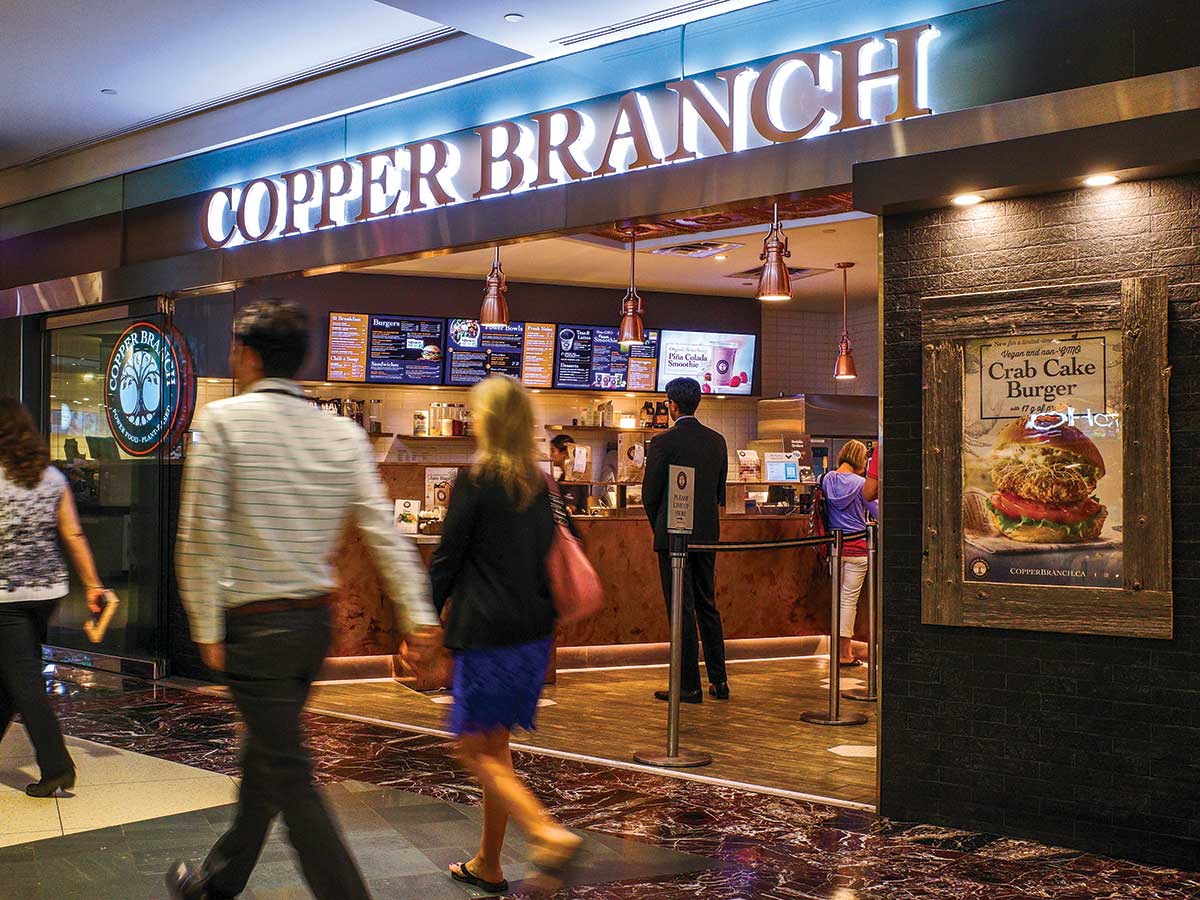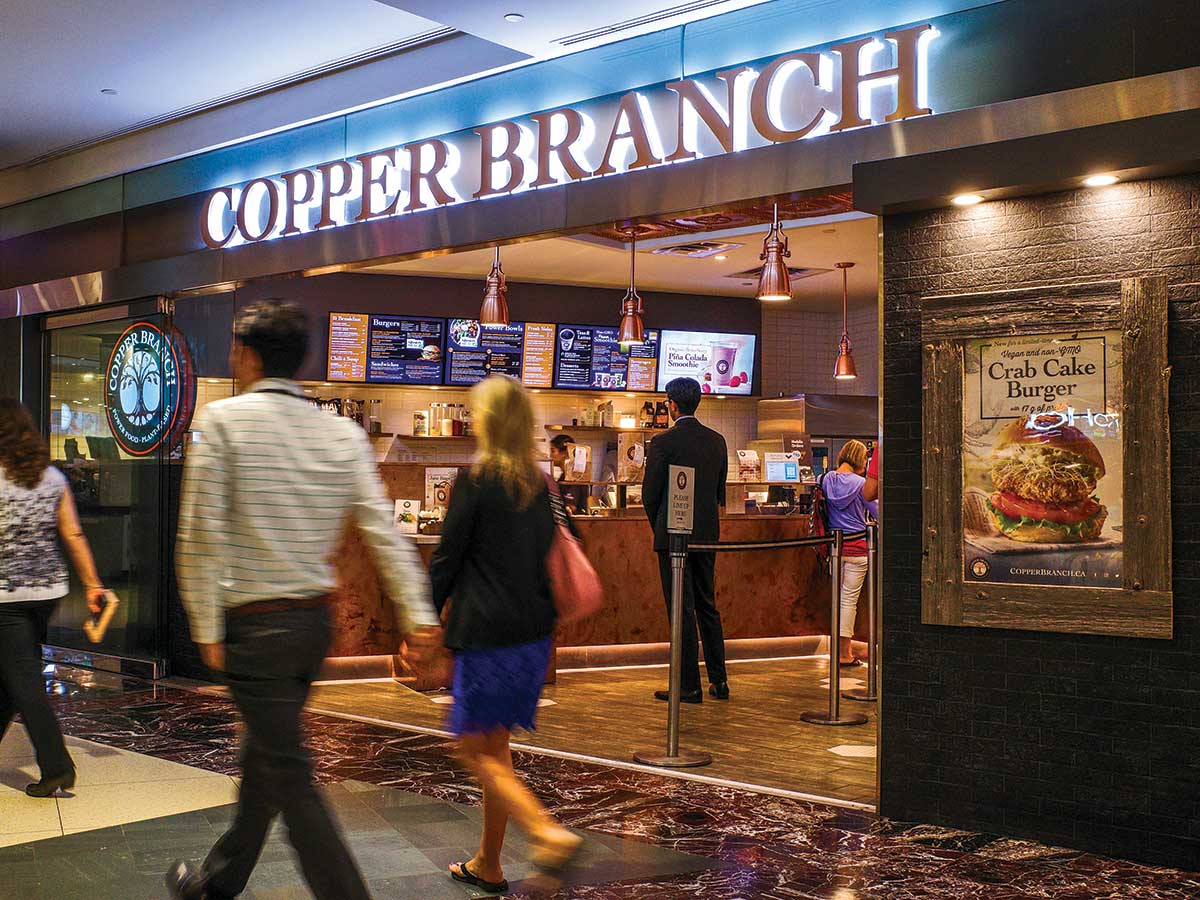
How veganism (quietly) infiltrated fast food
 Toronto’s Commerce Court (Daniel Neuhaus)
Toronto’s Commerce Court (Daniel Neuhaus)
Until 2014, Montreal entrepreneur Rio Infantino was a sandwich man. He owned 15 Subway restaurants over the course of 20 years. When he bought his first franchise in 1992, Subway was growing rapidly as a healthy alternative to McDonald’s. But when our cultural understanding of healthy changed, a carb-loaded bun stuffed with processed meats and questionably crisp lettuce no longer fit the description.
Infantino changed, too. In middle age, he gained weight and decided to eschew fatty cold cuts for plant-based whole foods. In 2014, betting that there were many others like him—people who want healthy choices but haven’t staked their whole lifestyles on the food they eat—he launched Copper Branch, a fast-food chain that serves smoothies and power bowls without any meat, dairy or animal by-products. It turns out the trick to making vegan fast food scalable may be counterintuitive: just don’t call it vegan.
It was a big risk. At the time, Subway was the world’s largest fast-food franchise. But Infantino was onto something. Since 2015, Subway has closed eight per cent of its locations, and Copper Branch recently opened its 63rd restaurant; most are in Canada, with a few in the U.S. and France. It’s a far cry from Subway’s 44,000. But Copper Branch is in expansion mode, with plans for 200 new outposts globally by 2020 and a total of 2,000 by 2029.
It’s an understatement to call Infantino’s growth plan ambitious—on the low end, that’s 33 locations per month between now and January. Still, the timing for expansion in the vegan market seems right. Demand for traditional, meat-filled fast food is slumping. Burger King, for example, is closing two locations for every new one it’s opening, according to Restaurant Business magazine. At the same time, interest in meat-free dining is rising, in part because of the health benefits and environmental impacts; it takes a lot less carbon to grow pea and soy than to raise pigs and cows.
One of the biggest surprises about Copper Branch is that the word vegan is almost impossible to find in the chain’s branding
In England, shares in Greggs, the U.K.’s largest bakery chain, grew by seven per cent after it introduced a vegan sausage roll that sold out in its first week. In France, a country built on Camembert and duck confit, sales of plant-based proteins jumped by 82 per cent in 2016, according to research institute Xerfi. And in Australia, the number of new animal-free product launches nearly doubled between 2014 and 2016, according to the Food Revolution Network.
Yet vegans and vegetarians are still a relatively small percentage of the population. While a 2018 study from Dalhousie University found that roughly 10 per cent of Canadians were either vegan or vegetarian—the highest number ever—those findings are nuanced by a recent University of Guelph study pointing out that nearly one-third of Canadian vegetarians and almost half of Canadian vegans eat meat “relatively regularly.” They just don’t like to admit it. So, are vegan chains building businesses without a sizable market? Or can the relatively small number of committed vegans sustain them?
The answer to both questions is no. One of the biggest surprises about entering a Copper Branch location—where fit hipsters sit at reclaimed wood tables and chow down on General Tao tofu and power bowls—is that the word vegan is almost impossible to find in the chain’s branding. It shows up in small print on the menu to flag items like vegan cheese and “crab” cakes, but otherwise, Andrew Infantino, Copper Branch’s global director of marketing (and Rio’s son), says, “We don’t use the term vegan. We’re trying to avoid any hippie-ish baggage. Instead, we say ‘plant-based.’”
That’s because Copper Branch is trying to appeal not only to diehard vegans—the kind that wouldn’t wear leather, let alone eat an omelette—but an expanding group of flexitarians and reducetarians, people who are cutting back on meat and dairy. The Guelph study also found that, on the whole, Canadians are generally consuming fewer animal by-products—85 per cent of us opt for meals with meat-free proteins at least once a month.
“We are trying to be accessible to all people, not just vegans. It’s important that our flavours appeal to a mainstream person.”
That broad flexibility is driving growth in the market, spurred in part by recent changes to the Canada Food Guide, which is encouraging people to eat more vegetables and fewer steaks and pork chops. “We are trying to be accessible to all people, not just vegans,” says Andrew Infantino, who himself adopted a plant-based diet when he joined the company five years ago. “It’s important that our flavours appeal to a mainstream person.”
Which they do. The General Tao is tangy yet sweet, and the tofu has a texture that’s surprisingly similar to chicken. At $14.25, it’s more expensive than a $5.99 Big Mac, but Copper Branch is competing on quality—including organic and fair-trade ingredients—not simply price.
There is a growing number of vegan chains serving similar comfort foods, such as London, Ont.-based “burger” joint Globally Local, which plans to open 10 new locations on top of its existing three over the next year, as well as Veggie Grill in the U.S., which recently opened its 33rd location and plans to open eight to 10 more by the end of 2019.
There will be competition, too, from traditional fast-food places, which are increasingly pivoting toward plant-based foods to boost sales. At a time when Burger King’s foot traffic dropped by 1.75 per cent across the U.S., its meat-free Impossible Burger drew 16.75 per cent more people than usual when it was test-launched at a St. Louis store in April 2019, according to a report on CNBC.com. Likewise, in 2018, when Canada’s A&W introduced its pea-based Beyond Meat burger, it sold more than 90,000 units within three days and ran out nationwide.
A&W’s burgers are produced by the American company Beyond Meat, which raised more than $240 million (U.S.) in its recent IPO, before its share value tripled due to strong demand for its products. Even bigger players are elbowing their way into the plant-based game, too. Canada’s Maple Leaf Foods, whose first-quarter sales alone exceeded $907 million in 2019, has been acquiring plant-based startups including Lightlife Foods and Field Roast to bolster its vegan offerings, and recently announced a $310-million (U.S.) processing plant in Shelbyville, Ind., dedicated to meatless proteins. Its newly launched Lightlife burger, which, like the Beyond, has a beef-like taste and texture, is rolling out to thousands of grocery stores and restaurants in the coming months. Soon vegan options, if not vegans, will truly be everywhere.